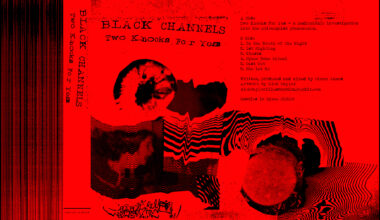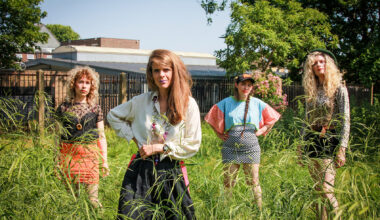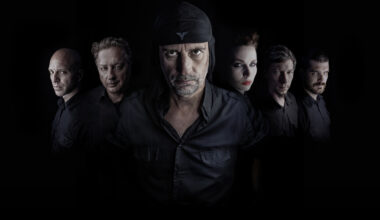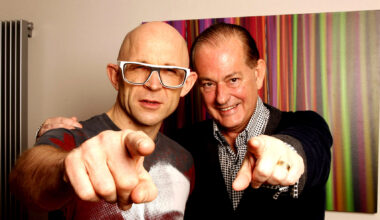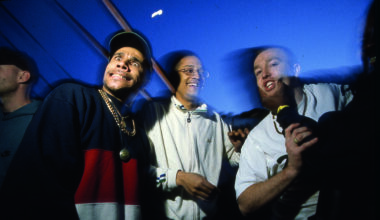Appearing seemingly out of nowhere with her stop-you-in-your-tracks album ‘The Kid’, Kaitlyn Aurelia Smith talks Buchla, the great outdoors, Buchla, why electronic music very much isn’t cold and uninviting… and Buchla
On a stage in London’s Kings Cross, something revolutionary is happening. A projector screen is illuminated with brilliant hues and images of particles rushing towards each other. Strange organic forms merge, grow and split apart. It’s a captivating flood of psychedelic brain food. But the Scala’s large crowd has its collective attention focused on the remarkable presence of Kaitlyn Aurelia Smith, who operates the blinking lights, esoteric wires and dials of her Buchla synthesiser and sings into a radio microphone, moving in time to the music and weaving a spell stranger and more compelling than anything on screen.
Kaitlyn Aurelia Smith sings songs that get inside your head and stay there, yet she also creates electronic reverberations as experimental as any avant-garde sound sculptor. It’s a pleasing paradox that makes her like few other artists.
Originally from Washington, the Los Angeles-based musician caused a stir in 2016 with her breakthrough album ‘Ears’ on Western Vinyl. Its opener, ‘First Flight’, was a hallucinogenic voyage into spiralling electronics redolent of 1970s kosmische synth wizards, with lyrics that suddenly emerged in her singular voice, while on ‘Envelop’, new age atmospheres gave way to an entrancing entanglement of synth riffs and live horns.
Her latest record, the recently released ‘The Kid’, further develops that distinctive sound. ‘In The World’ feels like setting foot inside a lysergic woodland of too-vivid green, an electronic folk piece that morphs into another song of delirious positivity. ‘To Follow And Lead’ is a bona fide left-field pop gem led by a meandering bass buzz and decorated with glimmering emerald textures. It’s all so exquisitely realised, it’s hard to believe that Smith has just appeared from nowhere, and indeed, ‘The Kid’ is actually her sixth solo album and her route to recognition has been gradual.
“I’ve been touring for the last four years straight, so it’s been a slow growing thing,” says Smith from her home in LA. “It’s felt nicely paced, it’s been fun to grow with the audience in an exchange of listening and sharing.”
Smith grew up on Orcas Island in the San Juan county of Washington state, a place that gave her an appreciation of the great outdoors from a young age.
“It’s beautiful,” she says. “It’s got a similar climate to the UK, it’s very mossy and lush, and has an incredible community. It’s my favourite place in the world. I grew up in nature, and have always loved camping. I slept outdoors for a lot of my childhood. It’s a very comforting place for me.”

She studied composition for orchestral instruments and classical guitar, and sound engineering at Boston’s respected Berklee College of Music hoping to get into film composing, and it was there that she formed an indie-folk band, Ever Isles. But a rather serendipitous encounter with a Buchla 100 modular synthesiser saw her completely change course.
“It happened very organically,” says Smith. “It just dropped into my life. A neighbour introduced me to the Buchla and actually lent me it. It wasn’t even as if I was searching for it in any way. It’s hard to explain what drew me to it. I don’t really hear a difference between analogue sounds and acoustic ones because they both have a sense of breath and air. With the analogue I can feel that air, I can feel the electricity more, which feels like a very natural element.”
Her use of the Buchla 100 in such an original way – for melodies and effects, but also as an organic texture, a breathing material with the same “living” resonances as the wood of a guitar or a piano – has helped lead a revival of interest in the vintage device (and boost the popularity of modern iterations such as the relaunched Buchla Music Easel). Smith collaborated with another Buchla magnus, Suzanne Ciani, on 2016’s cosmic ‘Sunergy’ album for the Brooklyn-based RVNG Intl imprint, and is able to extract and invoke sounds from the synth that few others could dream of. Yet Smith says that the Buchla is like any other instrument: the sound, however it’s created, is of paramount importance, not the manner in which it’s made.
“Everyone creates differently. I think all synths have their specialties – the Buchla is just the first one I learned and fell in love with. But I play a lot of different synthesisers. I just gravitate towards the sound, whatever seems right for what I’m looking for.”
As an artist who summons organic worlds with her music – no doubt influenced by the environment in which she grew up – and having moved towards electronics after starting out playing acoustic instruments, Smith is puzzled by the perception of machine-made sounds as cold or uninviting.
“It’s not my experience of electronic music,” says Smith. “I think that a lot of it has to do with rhythm. I find that a lot of music with repetitive rhythm is cold. But everyone hears differently. For me, life is a constant movement that feels like you don’t know where it’s going to go. It feels like it’s evolving and not returning to the same thing. That’s what I like to make and hear in music.”
A breathing biosphere is evoked throughout ‘The Kid’, where synthetic bird song melts into bubbling rhythms that cascade like running water over lichen-covered boulders, and synth melodies like vines zigzag through viridian glades, unfurling hypnotic harmonies along the way. The record is dedicated to the idea of new consciousness, life and death, and its theme arose from two separate subjects that Smith was recently preoccupied by.
“One of them was conversations with my dad,” she says. “He’s really interested in the four stages of life, so we talked about it a lot. It’s something I’ve heard about and read about a lot, because I’ve always had a fascination with learning different life philosophies, studying western philosophies and eastern ones. And the eastern ones are based on a cyclical system divided into four stages.
“Another thing was unfortunately losing someone very close to me. So the thoughts of the life and death cycle were very relevant. That individual was very influential to me, in a sense that he always had a charismatic youthful energy and a playfulness.”
While we have you, why not take a minute to browse our online shop?
We’ve got print magazines, limited edition vinyl, must-have books, CD boxsets, and we ship worldwide. Click below to open a new tab and keep your current reading place.
A sense of playful discovery pervades the record, and the title ‘The Kid’ alludes to the realisation and sense of self that a child experiences as they grow up and gain new consciousness.
What sets Kaitlyn Aurelia Smith apart from other synth sages is her singing voice. Many devotees of experimental electronic sound prefer to let their machines do the talking, but Smith’s magical vocal tones are enmeshed with her analogue creations. Sometimes this takes the form of discernible words, while at other times, the vocal cords become another instrument entirely, inseparable from the other sonic elements.
“I see the voice as where it all begins, because that’s the instrument I always carry with me,” says Smith. “Everything I play or assign a melody or harmony to, it’s just an extension of the voice, usually because my voice can’t do it. I tend to start with the vocal and go from there, filling in what my voice can’t do with the instruments.”
The orchestrations that adorned her first album are further developed on the new record, which features the Stargaze Quartet on several tracks, such as the moving ‘I Am Curious, I Care’. Smith also recently participated in the Organ Reframed festival in London, where she composed a new piece, ‘Action Of Inaction’, to be performed by a pipe organist and the London Contemporary Orchestra. It’s an area she’s continuing to explore and incorporate into her predominantly electronic songs.
“That’s always been a part of my musical life, because I started with orchestral instruments,” she says. “Orchestration has always been my intention with music, it’s just hard to access it. But if I can access an orchestra it’s definitely my preference instrument wise.”
For now, Smith won’t reveal what 2018 has in store, but it’s clear that there are more exciting projects to come. It’s a genuine possibility that she could become a big star, and the most unusual kind: one who refuses to water down or compromise on her playful approach to music.
“I think it’s important in life to always find ways to play,” says Smith. “That’s something I want to share with people.”
‘The Kid’ is out on Western Vinyl

